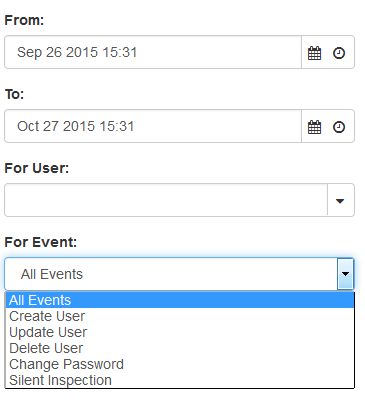Reports
Reports are designed to give you as an administrator an overview as to what systems are being most frequently used and what activity has been going on in the system.
Contents
Summary
This is the graphical representation of the activity that has been happening over the past 7 days. You can see trends of when people are logging in and when. Synchronisation stats are included to show you what has been updated for each Sync Profile. An example of this page is below:
User activity
This report you can customise to show the information that you are interested in the format is below:
The Report includes:
- Event – This outlines what the user did, either Authentication (Logging in for the first time), Authorisation (Logging into a service) or Authentication Failed (Bad username and/or Password)
- IP Address – The IP that the user logged in from.
- Date and Time
You can filter this search with the following options:
- From and To: These are the date fields that allow you to choose a date range for your events to show for. Clicking on the
 brings up a calendar to allow you to pick a date and choose a time. You can also adjust the values in the box directly.
brings up a calendar to allow you to pick a date and choose a time. You can also adjust the values in the box directly. - For User: This will narrow the search down to a single user. As you begin to type it will show you options that match what you are currently typing.
- For SSO Service: This is a dropdown which will allow you to choose the Service that you are interested in.
- For Event: Allows you to choose what the user did, either Authentication (Logging in for the first time), Authorisation (Logging into a service) or Authentication Failed (Bad username and/or Password)
Admin activity report
This reports shows a report on activity inside this administration console. It looks as per the below:
This Report includes:
- Event – This outlines what the user did, from creating users, editing users, deleting users, changing passwords, or silent inspection etc.
- IP Address – The IP that the user logged in from.
- Date and time
Options for filtering the report as below:
- From and To: These are the date fields that allow you to choose a date range for your events to show for. Clicking on the
 brings up a calendar to allow you to pick a date and choose a time. You can also adjust the values in the box directly.
brings up a calendar to allow you to pick a date and choose a time. You can also adjust the values in the box directly. - For User: This will narrow the search down to a single user. As you begin to type it will show you options that match what you are currently typing.
- For Event: This allows you to choose an administration event, the options are show above.
Download Report
You can also download the reports that are generated on your school's Cloudwork dashboard by clicking download. An email will be sent to the user. Go to the email sent from reports and follow the link in the email. This link will lead you back to the dashboard where you can click the hyperlink and get the report in the form of a CSV file. User, Administrator and Provisioning report will have different contents. An email will not be sent if there data in the reports.
Downloaded User Activity Report
The Reports that come from User Activity contain:
- Date: Time and date of when activity occured
- Name: Username
- IP Address: IP address of user
- Service: What SSO Service did the user Sign in to
- Event: What the user did in Cloudwork dashboard or Cloudwork id
Downloaded Administrator Activity Report
The Reports that come from Administrator Activity report contain:
- Date: Time and date of when activity occured
- Event: What the user did in cloudwork dashboard or cloudwork id
- IP address: IP address of user
- Name: Username
- Details: Give some more details about the event
Download Provisioning Report
The Reports thtat come from Provisioning Report contain:
- updated: How many users were updated
- added: How many users were added
- deleted: How many users were deleted
- disabled: How many users were disabled
- event: What type of syncronisation occured]
- syncprofile_name: Name of the Sync Profile
- errors: How many accounts failed to sync
- date_finished: What time and date did the sync finish
- processed: How many users were processed
- date_started: What time and date did the sync start
- details: Additional Information about the syncing process




